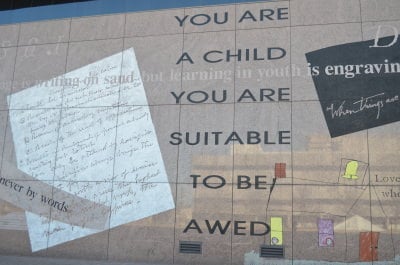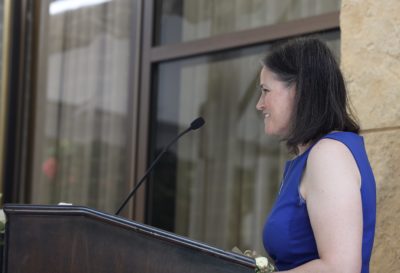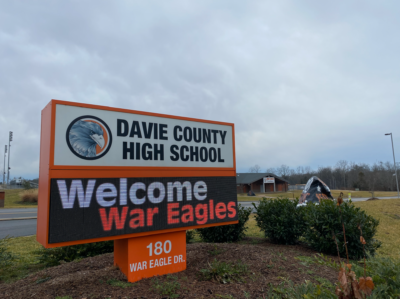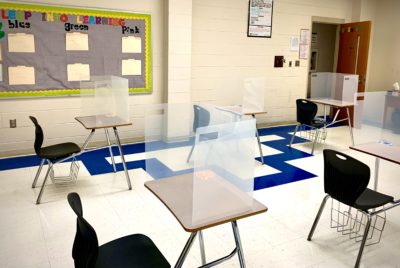New from EdNC

Revisions to social studies standards spark debate
After taking input from new State Superintendent Catherine Truitt, the State Board of Education heard today a revision to recommended social studies standards for the state.…

NC Teacher of the Year selected as finalist for National Teacher of the Year
Maureen Stover, the 2020 Burroughs Wellcome Fund North Carolina Teacher of the Year, has been selected by the Council of Chief State School Officers (CCSSO) as one of four finalists for the National Teacher of the Year award.…

Davie County educators receive COVID-19 vaccinations
On Jan. 27 at Davie County High School, the Davie County Health Department, in partnership with the school district, vaccinated more than 300 staff members.…

Perspective | Leading in the ‘new normal’ — Continuing communication during COVID-19
Practitioners Melissa Altemose and Lauren Lampron created a mini-series about school leadership during COVID. Last week, they expounded upon strategies for building trust during COVID-19.…

Perspective | TRIO Talent Search alumna shares experience and advice for first-gen students
One of my favorite parts of working with TRIO Talent Search is getting the chance to chat with students who have made it through a year or two of college.…
The Editor’s Notes
From EdNC’s Alex Granados:
Senate Democrats held a press conference yesterday morning to discuss some of their priorities for the long session of the General Assembly.
On education, they listed a school construction bond, increasing broadband access for students, and increased funding to meet the mandates of the long-running Leandro court case as some of their top issues.
Sen. Valerie Foushee, D-Chatham, pointed out that a court-ordered Leandro action plan requires $427 million this year to meet the state’s constitutional obligation to provide every student the opportunity for a sound, basic education.
Senate Minority Leader Dan Blue, D-Wake, said that Democrats will also likely file a bill to restore Master’s Pay for teachers as they have done in past sessions.
From Dawn Baumgartner Vaughan and Colin Campbell in the Insider:
Gov. Roy Cooper said Wednesday that he is asking school boards, superintendents and health officials to look at the latest Centers for Disease Control and Prevention study about safely reopening schools and mitigating COVID-19 spread. The governor did not have a timeline for any decision on schools yet. The state legislature is also looking at what legislation might be needed to help students with learning loss from daily, in-person education.
A majority of North Carolina’s public schools started the year with remote learning. Since October, elementary schools have been allowed to reopen for full-time, daily in-person instruction. Middle and high schools may open under a Plan B, which has more restrictions on social distancing. All students and staff must wear masks. In the Wake County Public Schools System, the largest in the state, elementary schools had reopened for full-time in-person learning, with middle schools are open on a rotating schedule and high schools are fully remote learning. WCPSS also offers an all-remote Virtual Academy option. Plans to reopen in-person school in January was delayed now until at least mid-February for Wake County.
Senate leader Phil Berger told reporters on Wednesday that lawmakers are looking at options, but said there’s no specific plan for legislation yet. He said it would be more appropriate to leave school opening to local school districts’ discretion instead of a statewide policy. “My hope would be the governor calling for opening schools on full time, in person basis, with protocols,” Berger said.
Berger lamented the time lost when schools were closed at the end of the 2019-20 school year, along with half of this year for full-time instruction in-person. “I’m fully convinced there are thousands of children who will never catch up as a result. It didn’t have to be that way,” he said.
House Speaker Tim Moore voiced similar concerns, but he didn’t specifically address how lawmakers might intervene. “It’s very clear our schoolchildren are falling behind right now,” he said Wednesday. “You can be the best instructor with the best internet on the best computer. They are not going to learn as well through that medium.” Moore said public schools already have enough resources to reopen safely, and he reiterate his call for summer instruction for students who haven’t kept up.
Need to know
STRENGTHENING RURAL ANCHOR INSTITUTIONS: FEDERAL POLICY SOLUTIONS FOR RURAL PUBLIC COLLEGES AND THE COMMUNITIES THEY SERVE
A look at 118 rural public colleges that fulfill their anchor institution role by fostering access to college, supporting local economies, addressing critical workforce shortages, and contributing to public health... Read the rest
-
LATEST RESEARCH | Data and Policy to Guide Opening Schools Safely to Limit the Spread of SARS-CoV-2 Infection
-
How can school superintendents lead during the COVID-19 crisis?
-
How the pandemic is propelling demand for short-term college programs
-
Apprenticeships are an overlooked solution for creating more access to quality jobs



